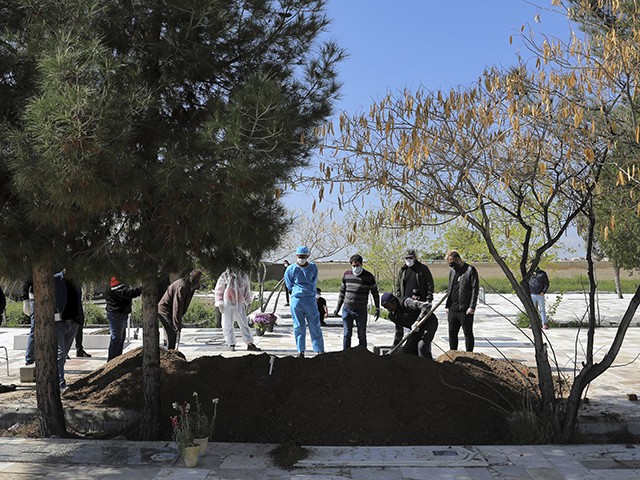Mojtaba Yazdani, deputy director of municipal services for the Iranian capital of Tehran, said on Sunday that 10,000 graves have been dug in an area of the massive Behesht-e Zahra cemetery reserved for coronavirus victims, and grave-digging is still underway.
Yazdani’s comments contradicted Iran’s official but widely doubted coronavirus statistics, which stood at 71,686 confirmed infections and 4,474 deaths as of Sunday.
Al-Arabiya noted the Iranian health ministry sought to reconcile the difference between over 10,000 graves and fewer than 5,000 officially recognized victims by warning that if social distancing regulations are not strictly observed, the death toll could reach 30,000 by the end of April.
Other parts of the Iranian government, however, are carrying on as if the worst of the epidemic is over. President Hassan Rouhani announced on Sunday that “low-risk” businesses would be allowed to reopen in Tehran on April 18. Most government offices have already been reopened.
The Iranian resistance group POI/MEK claims the true death toll is already approaching 30,000. On Monday, it said over 26,200 people have died, over five times what the regime has admitted to, and fatalities are still spiking in several cities.
POI/MEK quoted Yazdani’s account of digging 10,000 graves in Tehran and cited Iranian state media reports that huge refrigerated containers and emergency supplies have been moved to the Behesht-e Zahra cemetery. The group noted that contrary to Rouhani’s confident claims of victory over the virus, other Iranian officials are warning about exhausted doctors, overwhelmed hospitals, infections still growing in Tehran, and a medical system completely incapable of handling the second wave of infections that Iranian doctors believe is coming.
In addition to the regime deliberately concealing coronavirus cases, doctors quoted by POI/MEK said impoverished Iranians worry that admitting to a coronavirus infection could spell doom for their entire families since they cannot afford to miss work or pay for extensive hospital stays.
The Washington Post wrote on Friday that the scale of Iran’s coronavirus epidemic has been “obscured by often upbeat stories about survivors in Iran’s official media and by an inscrutable government many suspect is underplaying the toll.”
The Post spoke to Iranians who reported horrifying chaos at hospitals, doctors who were slow to diagnose patients with the Wuhan virus, nurses who panicked when they encountered a patient who unquestionably had the disease, and families who were unaware their loved ones had tested positive for the contagion. Several of the Post’s Iranian correspondents spoke of hospitals evicting patients who still need medical care without their consent because they were under pressure to open up beds for coronavirus victims.
Rouhani’s government on Monday promised to protect citizens from the economic impact of the coronavirus and defended his decision to avoid a full lockdown, insisting that public safety was his top priority and health protocols would “continue in a strong and forceful manner.” Rouhani’s health officials insisted the number of coronavirus cases in Iran has peaked and is beginning to decline.
The U.K. Guardian reported Rouhani’s economic proposals are seen by critics as too little, too late:
The signs of pressure on the government are growing. In an unprecedented step, union leaders have refused to back a proposed 21% increase in the minimum wage – well below the current 40% inflation rate.
Ministers are offering individual loans to those suffering most, but even that help is being criticised, as the monthly repayment instalments will attract 12% interest.
Newspapers have also been dealt a heavy blow, with the government proposing to ban all but online newspapers temporarily on the basis paper might transmit infection. The plan, subsequently withdrawn, led to warnings of mass permanent newspaper closures. Redundancies, including in prestigious reformist newspapers such as Etemad, have gone ahead.
“Like attacking a victim with pre-existing conditions, the virus that causes COVID-19 has left a lethal impact on Iran’s economy, which is already suffering from high inflation, high unemployment, sanctions, mismanagement and widespread corruption. The Iranian economy simply does not have the resources to help Iranians protect themselves during this pandemic,” Al-Monitor judged on Monday.
